Vocal: Art Garfunkel's "Watermark," Gordon Lightfoot's "Endless Wire" ....Opera: Mozart's La Clemenza di Tito, Cilia's Adriana Lecouvreur .... Instrumental: Byrd's My Ladye Nevells Book .... Jazz: Jay McShann's "The Last of the Blue Devils".
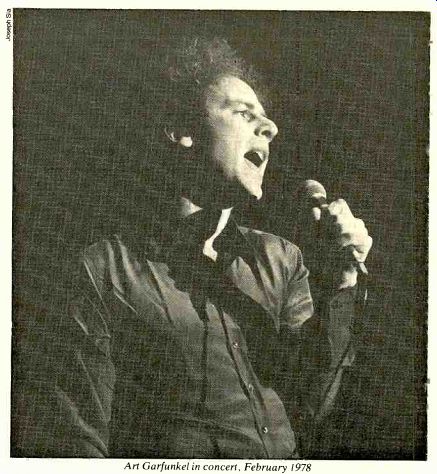
-------------
above photo: Art Garfunkel in concert, February 1978
Garfunkel Sings Webb: A Fusion of Two Major Talents Produces an Album to Be Proud Of
A Stanley found Livingstone, as Merman found Porter, as Warwicke found Bacharach, so Art Garfunkel has, happily, found Jimmy Webb, for his new album, "Water mark," may well turn out to be a water shed in Webb's career. In it, with Webb himself hovering about on key boards, Art Garfunkel sings eleven Jimmy Webb songs better than anyone else has so far. Garfunkel has exactly the right spare, intelligent vocal style for Webb's intense, deeply felt lyrics and the nonchalant but enormously se cure musicianship the elusive music demands. In song after song Art Garfunkel brings to performing completion the work of one of America's best writers of popular music.
If there is a single high point in the al bum it is probably Garfunkel's performance of Webb's 1972 song Mr. Shuck 'n' Jive, in which the acid of the lyrics etches a portrait of an angry loser. Typical of Webb and his ability to zap you slyly when you least expect it are the lines "If you can get yourself together, kindly write a criticism of this song./ How it's exquisitely constructed, yet mechanical and somehow slightly wrong./Put it in your book about the enemy you never met." Of course this shaft is directed at Mr. Shuck 'n' Jive or is it? Is it perhaps aimed at the all-too-comfortable listener who was be ginning to feel pretty good about his own superiority? Garfunkel manages to infuse these lyrics with a generous compassion that makes sense of, and gives heart to, the final lines, "You know, you just might make it yet, Mr. Shuck 'n' Jive." Another fine job is done on Crying in My Sleep, in which Garfunkel creates the fluorescent-light-burning-at-three-o'clock-in-the-morning atmosphere of emptiness and futility, all that is left of a burned-out love affair. But it is the fusion of the two major talents, Garfunkel and Webb, in everything that is done here that gives the album its glow.
All My Love's Laughter and Watermark, two songs now a decade old, seem to be fresher than anything I've heard all year, and for these alone Garfunkel would deserve a large measure of our gratitude.
So, hurray for everybody-Garfunkel, Webb, and, most of all, the listener. "Watermark" is a truly distinguished effort [ignore if you can one puerile, non-Webb trifle from 1959 titled (What a) Wonderful World, sung for much, much more than it's worth by Garfunkel, Paul Simon, and James Taylor] and an album of which every one involved can be enormously proud.
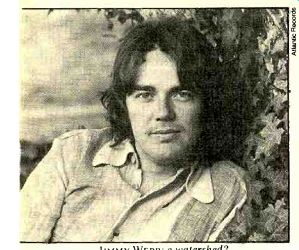
------- JIMMY WEBB: a watershed?
Quality this high is hardly typical of the pop scene, so I suggest that you grab it at once for your permanent collection.
-Peter Reilly
ART GARFUNKEL: Watermark. Art Garfunkel (vocals); Jimmy Webb (keyboard); vocal and instrumental accompaniment.
Crying in My Sleep; Marionette; Shine It on Me; Watermark; Saturday Suit; All My Love's Laughter; (What a) Wonderful World; Mr. Shuck 'n' Jive; Paper Chase; She Moved Through the Fair; Someone Else (1958); Wooden Planes. COLUMBIA JC 34975 $7.98, JCA 34975 $7.95, JCT 34975 $7.98.
-----------------------
La Clemenza di Tito: Reincarnation For a Misunderstood Mozart Masterpiece
LA CLEMENZA DI TITO is a late work of Mozart in the opera seria manner. It is often said to have been a failure, written in haste to satisfy a royal commission and already old-fashioned in its own day. Except for the fact that it was written quickly (nothing unusual for Mozart), most of this is untrue. The work became a success shortly after a mixed reception at its 1791 premiere (at the coronation of Leopold II as King of Bohemia). And it is perfectly clear that Mozart, working closely with his librettist Caterino Mazzola, transformed the old Metastasio libretto that came with the commission into something quite lively and contemporary. Recently the French director Jean-Pierre Ponnelle updated the work again by transferring the locale from ancient Rome to the eighteenth century-apparently with considerable success.
Whatever one thinks of this operatic stepchild, it is certainly no conventional opera seria. The action, such as it is, is trimmed down to the classical verities: two acts with a highly dramatic first-act finale. The music similarly dispenses with all the old trimmings; introductions, elaborations, repeats, interludes, and postludes have been cut to the bone. Instead of the traditional, ex tended, and showy arias, there are ensembles of a psychological character as well as brief, intense solo numbers ex pressing inner states. In short, this is not in the old mold at all, but highly innovative. However, it must be admitted that’s not even Mozart's genius could make anything really dramatic out of the interaction of a collection of paste board characters. (It would be interesting to know what Ponnelle did to solve these problems.) At any rate, in the great opera theater of the mind, the one that opens out opposite your speakers (or is it be tween your headphones?), these problems need not be troublesome. The tremendous brevity and incisiveness of this music--and, I must say, of this performance-themselves provide dramatic framework enough. The special qualities of the work emerge with great clarity; Tito is not at all the cold, neo classic bore of its reputation, but precisely the opposite: a tense, fast-paced, passionate, pithy treatment of a cold and boring neo-classic subject! Another hurdle for the modern listener is provided by the endless sound, however gorgeous, of female voices.
Only Tito (a tenor) and the relatively unimportant Publio (a bass) are scored for males; all the other leads, male and female, are written for the universal eighteenth-century mid-range high voice. These parts, originally sung by women and castrati, all lie fairly well within the modern mezzo-soprano range. Any opera so tirelessly beset by mezzo-sopranos-even ones as richly voiced, talented, and individual as Janet Baker, Yvonne Minton, and Frederica von Stade--is bound to suffer a bit from lack of vocal color. And I have another complaint as well: there is an obvious lack of understanding on the part of these singers of even the most standard vocal ornaments of the period. Those ornaments are quite as necessary here as they would be in a lesser work--and they should be right. Mozart, of course, was a much greater composer and man of the theater than, say, Salieri, but the same singers per formed the music of both according to the same conventions or traditions.
Certainly I'll take a full-blooded rein carnation like this any day and never miss a few dropped apoggiaturas, but, then again, why can't we have both? In every other respect, however, this new Philips set is superb both in performance and in recording. The great role of Sesto-originally a castrato part--is ably interpreted by the Australian mezzo Yvonne Minton. Janet Baker shows a good deal of passion--a quality not always associated with her beautiful and sometimes remote vocal sound-as Vitellia. Frederica von Stade is, in spite of a tight little vibrato, quite adorable in the role of Annio (apparently intend ed, like that of Cherubino, as a trouser role with the usual ambiguous sexual overtones).
Lucia Popp, a true soprano and a very different kind of singer from the other women, is stunning in the small role of Servilia. Stuart Burrows is a strong Tito and, along with Robert Lloyd as Publio, provides a welcome relief from all those sopranos. The playing is excellent under Colin Davis' strong direction.
-Eric Salzman
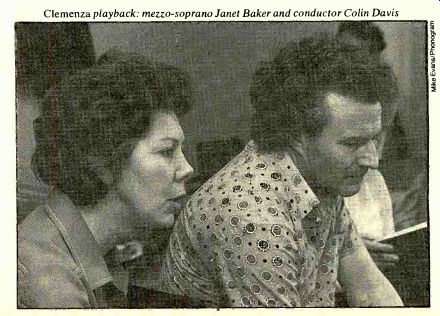
-------- Clemenza playback: mezzo-soprano Janet Baker and conductor Cohn Davis
MOZART: La Clemenza di Tito. Janet Baker (mezzo-soprano), Vitellia; Yvonne Minton (mezzo-soprano), Sesto; Stuart Burrows (tenor), Tito; Frederica von Stade (mezzo soprano), Annio; Lucia Popp (soprano), Servilia; Robert Lloyd (bass), Publio. Chorus and Orchestra of the Royal Opera House, Covent Garden, Colin Davis cond. PHILIPS 6703 079 three discs $26.94, 7699 038 $26.94.
-------------------------
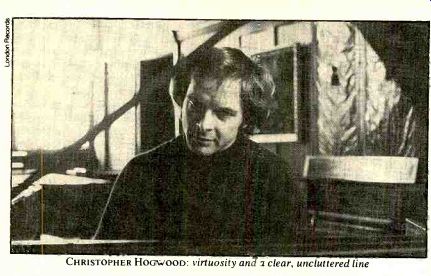
------ CHRISTOPHER HOGWOOD: virtuosity and u clear, uncluttered line
William Byrd's Musical World In a Rather Special but Rewarding Album
ON the jacket cover of harpsichord ist Christopher Hogwood's new recording (for L'Oiseau-Lyre) of William Byrd's collection of English virginal music known as. My Ladye Nevells Booke there is reproduced a handsome portrait of a fourteen-year-old girl. The painting was done in 1589, the Booke in 1591, so the subject, Elizabeth Bruges (Brydges), daughter of Lord Giles Chandos, could have been Lady Nevell-but she wasn't. We don't know just who Lady Nevell was-a patron or a pupil of Byrd-but whoever she may have been, she brought into being one of the most exquisite collections of music ever written, copied out in one of the handsomest volumes ever made. But, sad to say, the thought of having to listen to all of it at once (eight record sides) is more than a little grim. Having just done so, however, I would like to pass on a few words about the experience in order to encourage other listeners to brave it out as well.
The first two sides whet the appetite as one is introduced to the various musical genres (the stately pavans and galliards, subjective voluntaries, and lusty, folksy variations) and to the sounds of the instruments (virginals, Flemish and Italian harpsichords, and an English chamber organ). Once these sounds have been absorbed, there comes, I confess, a sort of dry spell.
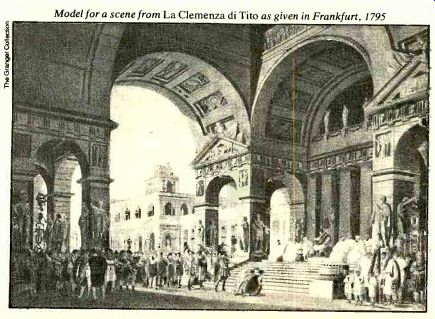
above: Model for a scene from La Clemenza di
Tito as given in Frankfurt, 1795.
But suddenly, with side five, a miracle happens as the strains of Qui Passe begin to take shape. One then becomes totally absorbed in the world of William Byrd while everything else fades into the background. Every detail of his musical genius shines forth: shapely melodies, exquisite ornamentation and variation, opulent harmonies, bold rhythms, and ingenious counterpoint. Monotony is dispelled and each work takes on an individuality which causes one to feel (not merely to know factually) that "Guglielmo Bird, compositore inglese," was one of the finest key board composers of the Renaissance.
Christopher Hogwood's contribution to this experience is not a mean one.
Technically, the music is fierce, but it holds no terrors for him. Also, he is perfectly at home on each of the instruments he plays and so can delineate its individual musical qualities. His approach is straightforward and strong: there is no fooling around with doubtful rhythmic alteration or bizarre articulation, but there is a flexibility of tempo and a sense of proper agogic accent that realize the music's expression. It should be noted that each work is played in one unchanged registration, so that the achievement of bringing it off is done not coloristically but through pure rhythmic control. Mr. Hogwood has also taken a definite stance on certain technical matters, such as the interpretation of the single and double slashes ubiquitous in scores of this school. Mr. Hogwood's reasoning makes sense and the result is a clear, uncluttered line rarely heard in performances of this music.
Obviously I recommend this album highly. True, it is very special, but I believe that dipping into it at first and then taking it in its entirety will prove a re warding experience, one that might possibly get you into the world of the virginalists for the first time.
-Stoddard Lincoln
BYRD: My Ladye Nevells Booke. Christopher Hogwood (harpsichord and organ). UOISEAU-LYRE D29D 4 four discs $31.92.
---------------------
Columbia's New Adriana Lecouvreur Surpasses The Previous Admirable Recorded Standard
AN accident of history may have placed Francesco Cilia (1866 1950) among. the veristic composers chronologically, but the raw vigor of verismo was alien to his gentle, self effacing personality. He had neither Giordano's stirring dramatic power nor Mascagni's or Leoncavallo's flair for stark contemporary realism. If there is a stylistic influence in his Adriana Le couvreur (a new recording of which has just been made available by Columbia), it is-in the lighter, mercurial episodes-that of Verdi's Falstaff.
Possibly swept along by Rudolf Bing's well-publicized reluctance to re vive Adriana for Renata Tebaldi in 1963, several critics maligned it then, creating an aura of condescension that persists to this day. While never considering it a masterpiece, I have always regarded the work as a touching, colorful, effective, and ingeniously contrived opera, eminently worthy of periodic revival. Much of its worth relates to a faithful re-creation of a historical period (the Paris of Voltaire), though the libretto suffers from the necessary condensation of Scribe's fascinating original play into a libretto of workable length. As for Cilia's score, we often find restatements of themes when fresh inspiration would have been more desirable, but the themes restated are in variably apt, insinuating, and lushly melodious. Given the right singers and a responsive conductor, Adriana can be exceptionally rewarding.
Happily, such is the case with the Columbia recording, which quite decidedly surpasses the London set (OSA 1311, still available), the version that has served this opera admirably for the past fifteen years. James Levine con ducts the music with loving involvement, maintaining discipline over the rapid, intrigue-filled episodes while savoring the grand, expansive moments.
Such dedicated leadership by a conductor of a generation supposedly out of touch with musical Romanticism certainly gives the lie to critical claims that we ought to bury operas of this sort.
The cast is just about perfect. Renata Scotto's Adriana is all loyalty, pride, defiance, jealousy, and despair, a tapestry of emotions convincingly realized in richly expressive colors and dramatic chiaroscuro. She handles the theatrical declamation in the third act superbly, sings both her familiar arias with poignant simplicity, and brings an unforgettably haunting expression to the phrase "No, la mia fronte, the pensier non muta" in the final duet.
Placido Domingo's singing has more forward projection than I recall from his previous recordings. The inconsistency of Maurizio's character is an intrinsic flaw of the play, thus frustrating a unified dramatic interpretation, but vocally the part fits him perfectly and he portrays it with vibrant sound and soaring passion.
With so many mezzos on the brink of turning into sopranos, it is a joy to hear the sumptuous contralto-like timbre of an honest-to-goodness mezzo like Elena Obraztsova as the imperious and formidably evil Princess. Sherrill Milnes portrays the sympathetic Michonnet with distinction and a restraint that is appropriate to the character, and there are excellent contributions by tenor Florindo Andreolli and, especially, bass Giancarlo Luccardi.
I find the technical presentation out standing in every respect, with a vividly effective employment of space and separation. A good English text by Glen Sauls and an informative essay by B. L. Scherer complete a triumphant presentation.
-George Jellinek
CILEA: Adriana Lecouvreur. Renata Scotto (soprano), Adriana Lecouvreur; Placido Domingo (tenor), Maurizio; Sherrill Milnes (baritone), Michonnet; Elena Obraztsova (mezzo-soprano), Princess de Bouillon; Giancarlo Luccardi (bass), Prince de Bouillon; Florindo Andreolli (tenor), Abbe de Chazeuil; Lillian Watson (soprano), Mlle. Jouvenot; Ann Murray (mezzo-soprano), Mlle. Dangeville; Paul Crook (tenor), Pois son; Paul Hudson (bass), Quinault. Ambro sian Opera Chorus; Philharmonia Orchestra, James Levine cond.COLUMBIA M3 34588 three discs $23.98.
-------------------
Jay McShann and Band: Performances to Stir The Soul and Make The Feet Stomp
"THE Last of the Blue Devils" does not have the intimacy of Jay McShann's last release, nor was it in tended to, for in it McShann and Buddy Tate are joined by a full rhythm section plus trumpeter Joe Newman and saxophonist Paul Quinichette, a member of McShann's band thirty-six years ago. The result is a strongly blues-flavored romp through some familiar territory.
McShann, who is either sixty-two or sixty-nine years of age, lends his pleas ant, slightly grainy voice to six of the ten selections, demonstrating that he could make it on his vocals alone. But he also happens to be an exceptionally fine pianist in the Kansas City tradition. Joe Newman, Buddy Tate, and Paul Quinichette-all past members of the Count Basie band-are superb throughout, gently nudging such tunes as 'Fore Day Rider, Confessin' the ... Blues, and 'Tain't Nobody's Bizness If I Do, swinging fiercely on Blue Devil Jump and the old Basie flag-waver Jumpin' at the Woodside.
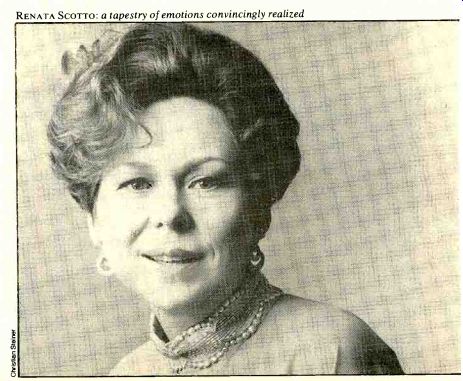
--------- RENATA SCOTTO: a tapestry of emotions convincingly realized
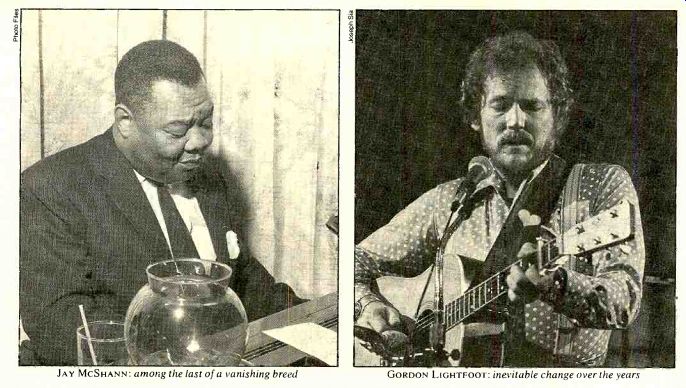
----- JAY MCSHANN: among the last of a vanishing breed; GORDON LIGHTFOOT: inevitable
change over the years.
The album's title may have been inspired by Jay McShann's appearance in a rather dreary, ill-produced film of the same name, but it is misleading. The Blue Devils was a now-legendary orchestra from Oklahoma City that toured throughout the Midwest during the late Twenties and early Thirties; from it emerged such talent as Hot Lips Page and the nucleus of the Count Basie band-Lester Young, Jimmy Rushing, Eddie Durham, and Basie himself.
McShann entered the musical arena in that area during the Blue Devils days, but he was never a member of the band. Nevertheless, Jay McShann is certainly among the last of a vanishing breed of musicians whose performances are designed to stir the soul and make the feet stomp-he and his vener able associates accomplish that full well in the generous forty-six and a half minutes of music contained in this album.
-Chris Albertson
JAY McSHANN: The Last of the Blue Devils. Jay McShann (piano, vocals); Joe Newman (trumpet); Paul Quinichette, Buddy Tate (tenor saxophones); John Scofield (electric guitar); Milt Hinton (bass); Jackie Williams (drums). Confessin' the Blues; Hootie Blues; 'Tain't Nobody's Bizness If I Do: Blue Devil Jump; My Chile; Jumpin' at the Woodside; Just for You; Hot Biscuits; 'Fore Day Rider; Kansas City. ATLANTIC SD 8800 $6.98.
-----------------
"Endless Wire," Gordon Lightfoot's 'Different' Album, Is His Rockingest
Yet SINCE change is inevitable, it is important to some to try to get through it gracefully. Gordon Lightfoot imparts hope and sets a good example in that difficult exercise. He has changed considerably over the years, but always gradually, ever gracefully.
His new Warner Brothers album "End less Wire" is a departure of sorts, but only to about the same degree that "Old Dan's Records" was in its time.
The new one, quantitatively measured-by the amplification of instruments and the nature of such songs as I Don't Mind, If There's a Reason, and the verse (but not the chorus) of End less Wire-is his rockingest album yet.
But it is really no more Rock than his Nashville one, "Summer Side of Life," was Country.
Lightfoot's other abiding interests, including his feel for the working class and working-class settings, his fond ness for narratives, and his preoccupation with the loved one who got away, are all in this one too. His songwriting is everywhere crafty and in spots exceptionally bright. Daylight Katy is a wonder, actually two seemingly un related kinds of song successfully combined, and the title song's chorus snares your mind from the straight-ahead rock mode of the verse and gives it a little snap. The Circle of Small, which 1 believe he's had around for a while, is the kind of song you hear and then say, "Now why wasn't that writ ten ages ago?" It's a natural, as if it's been hanging there in the air for years and Lightfoot was the first one smart enough to pluck it.
Overall, the album is "different." but, as I said, it's a gradual and graceful difference. Some time back he add ed a steel player--a particularly stylish one--in Pee Wee Charles. A little later he added an electric guitar as a major instrumental voice, but the people who play the electric guitar for him are Red Shea and Terry Clements, who've been his pals for years. So the sound his records have now has its own set of roots. It makes everyone involved, especially the listener, feel a little more secure about any more changes that might be on the way.
-Noel Coppage
GORDON LIGHTFOOT: Endless Wire. Gordon Lightfoot (vocals, guitar); Terry Clements (guitar); Tom Szczesniak, Rick Haynes (bass); Pee Wee Charles (steel guitar); other musicians. Daylight Katy: Sweet Guinevere; Hangdog Hotel Room; If There's a Reason; Endless Wire; Dreamland; Songs the Minstrel Sang: Sometimes I Don't Mind; If Children Had Wings: The Circle Is Small. WARNER BROS. BSK 3149 $7.98, M8 3149 $7.97, M5 3149 $7.97.
Also see:
Link |
Source: Stereo Review (USA magazine)